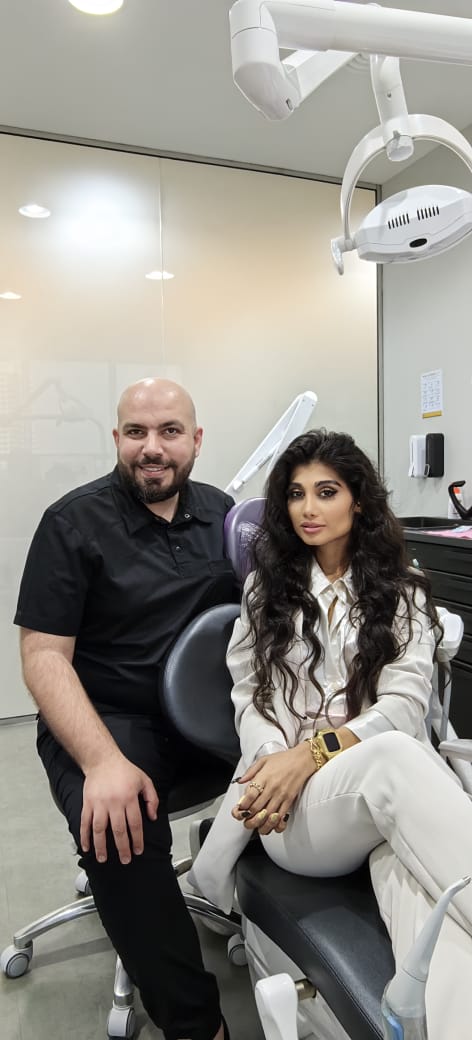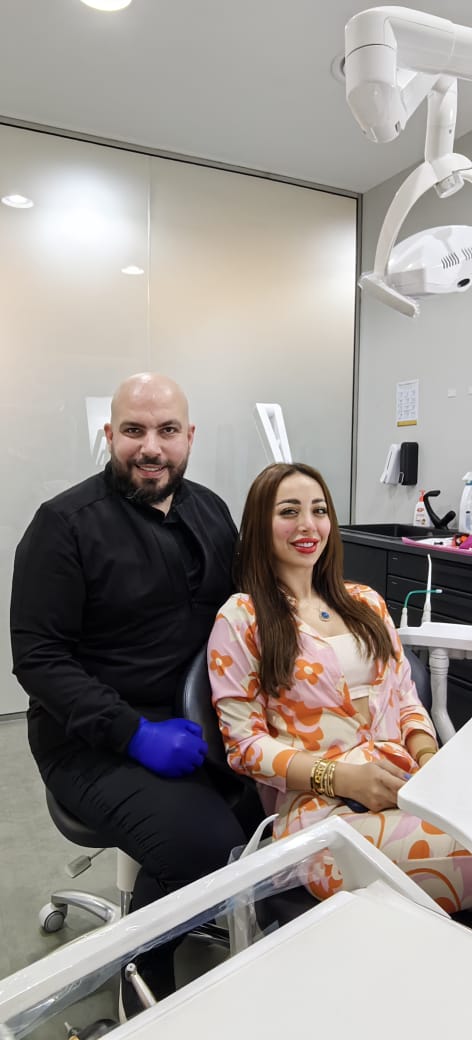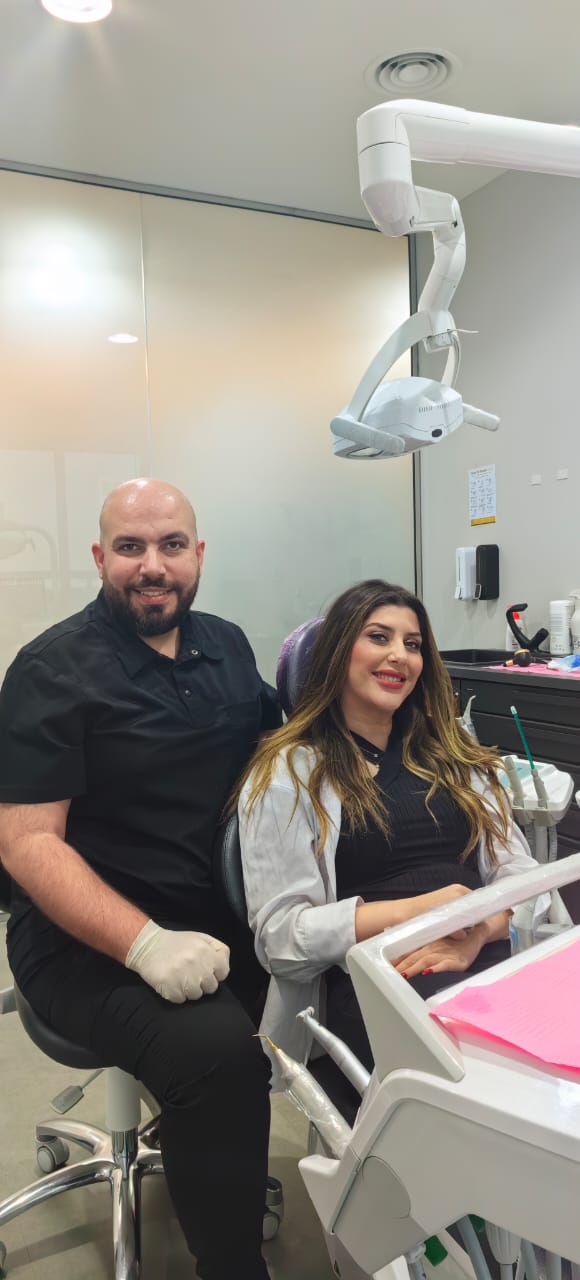Home / Endodontic treatment in Dubai
Root Canal Treatment
Procedure performed to save a tooth that has become infected or severely damaged
- Minimal Discomfort with a modern anesthesia techniques
- The fastest possible speed of tooth restoration
- Restoring the aesthetics of the teeth
110, 51 Business Tower, Business Bay
We work with insurance companies
We have over 12 years in practice
We will find a common language with everyone
We are high-rated dentistry in Dubai

Reviews on google maps:
-
Reem Al khateeb ★★★★★ 5 months ago
I recently had the pleasure of visiting this Clinic, and I can't say enough good things about my experience. From the moment I walked in, I was greeted with a warm and friendly smile from the receptionist, setting the tone for my entire … More visit.
The clinic itself was immaculate, and I was immediately put at ease by the cleanliness and modern decor. The waiting area was comfortable, and I didn't have to wait long before being called in for my appointment, which I greatly appreciated.
Dr. Halim and the entire dental team were not only highly skilled but also incredibly attentive. They took the time to explain each step of the process, making sure I was comfortable and informed throughout my treatment. Their commitment to patient care and comfort was evident, and it made a significant difference in my overall experience.
In addition to the excellent dental care, the clinic's commitment to patient education stood out. They provided me with valuable tips and guidance on maintaining good oral health, which I found extremely helpful.
Overall, my visit to this Clinic exceeded my expectations in every way. If you're looking for a dental clinic that combines top-notch dental care with a clean and welcoming environment, I highly recommend giving them a visit. Dr. Halim and the team have earned my trust and future treatments with their exceptional service. -
Adnan Khateeb ★★★★★ 5 months ago
My family and I had the pleasure of visiting this clinic, and we were delighted to receive a substantial discount during our visit. The clinic itself is truly impressive, boasting a serene ambiance and staffed by a team of consummate professionals. … More
I'd like to extend a special thank you to Dr. Halim for not only his exceptional medical expertise but also for his remarkable kindness and the thorough follow-ups he conducted. It's evident that he genuinely cares about his patients' well-being, and this level of dedication is truly commendable.
One added convenience we discovered during our visit is the parking situation. You have the option to park your car conveniently within the same building or utilize the RTA parking slots just a short distance away, making the entire experience hassle-free.
In summation, we couldn't find a single aspect to complain about during our visits. We wholeheartedly recommend this clinic to anyone seeking top-notch medical care in a welcoming environment. Kudos to the entire team for their dedication and excellent service – keep up the exceptional work! -
Maryna Krel ★★★★★ 5 months ago
It was so comfortable and perfect treatment 👍Thank you so much, decently will be back 👌 -
Blen Kebede ★★★★★ 8 months ago
I would like to recommend this dental clinic to everyone. It's definitely worth every penny. I had my treatment with Dr. Halim. The service is exceptional, and I'm talking about everyone - both at the reception and in the treatment … More rooms. Thank you very much, and I highly recommend it once again. -
Nisreen SB ★★★★★ 2 weeks ago
It was a wonderful experience and I recommend that clinic to everyone, Dr Haleem is super professional and the clinic is very clean, staff are helpful.
Thanks alot -
Bahara Kakabayeva ★★★★★ a year ago
Приветствую всех кто хочет подлечить зубы, или если вам не нравятся ваши виниры и вы хотите их поменять, то я смело могу посоветовать клинику Vie clinic by Halim, где работают настоящие профессионалы своего дела это доктор Халим и доктор … More Хана. Отдельная моя благодарность доктору Хане, замечательный человек и просто красавица, которая сделала всё возможное чтобы во рту была красота и комфорт. Весь коллектив клиники вежливый и внимательный большие профессионалы. Доктор Халим человек у которого всё под контролем, его умение руководить своим коллективом и умение найти подход к каждому пациенту говорит сам за себя.Greetings to everyone who wants to have their teeth treated, or if you don’t like your veneers and want to change them, then I can safely recommend the Vie clinic by Halim, where real professionals work: Dr. Halim and Dr. Hana. My special thanks to Dr. Hana, a wonderful person and just a beauty, who did everything possible to make my smile beautiful and comfortable. The entire clinic team is polite and attentive, great professionals. Dr. Halim is a person who has everything under control, his ability to lead his team and the ability to find an approach to each patient speaks for itself. -
Мур Мяу ★★★★★ a year ago
I'm so thankful this clinic and actually dr. Halim, because he helped my beauty. On the second day in my vocation I fallen in down and one of my teeth was broken om half. I was soooooo sad and did't know what to do ....So, I really … More liked the clinic, everything was clean. Dr. Halim is a pleasant and attentive man.I really grateful for your job. I wish everything is good and success!Я так благодарна этой клинике и вообще доктору Халим, за то, что спас мою красоту. На второй день моего отпуска я упала, и сломала наполовину зуб. Мне было оооочень грустно и я не знала, что делать....Сама клиника мне тоже понравилась, везде чисто. Доктор Халим приятный и внимательный мужчина. Рекомендую! -
Нурсултан Балтабай ★★★★★ a year ago
Hello everyone) I was treated by Dr. Halim, a wonderful dentist👍 a wonderful and polite team😊Ставил пломбу в этой стоматологии, устранил проблему блестяще и за короткие сроки. В общем рекомендую эту клинику👌 -
Fairouz senane ★★★★★ a year ago
In addition to the warm welcome and the beauty of the place, the quality of the service is absolutely amazing.After a dental check-up done by Dr. HALIM , we treated an old broken filling.I love the result, I'll be back for my next … More treatment for sure!Thank you! -
Manal Khatib ★★★★★ a year ago
I feel confident to recommend this clinicExceptional experienceI did many treatments with exceptional cost.Thank you doctor Halim. -
Aby Jose ★★★★★ 2 years ago
I recently had the pleasure of visiting vie clinic, and I must say, it was an exceptional experience from start to finish. As someone who is usually anxious about dental visits, I was pleasantly surprised by the warm and inviting atmosphere … More of the clinic. -
Ahmad Fahmy ★★★★★ a year ago
Very professional and friendly staff.I had an amazing dental treatment experience with Dr.Hana, she was very clear and she explained everything to me , then with a very smooth steps she released my teeth pain.Actually i booked for some … More aesthetic treatment.Highly recommend. -
Angelica Emurlaeva ★★★★★ 2 years ago
Was looking for Invisalign for my crooked teeth and luckily I found this clinic which is close to the place I’m staying in . Thank you for your delicate and professional work and I highly recommend Dr Halim . Keep it up 👏 -
Bohdan Tkachenko ★★★★★ a year ago
Thank you Dr Halim for giving me more reasons to smile!😌🙏Great experience ⭐️⭐️⭐️⭐️⭐️⭐️ -
Ciobanu Alin ★★★★★ a year ago
I am changing my whole mouth with brand new teeth from Italy haha 😁 Dr Halim is very professional and also the prices are very affordable 👍 keep it up and good luck
Endodontics or root canal treatment
Endodontics is a field of dentistry that specializes in the study and treatment of root canal disease, particularly chronic pulpitis and periodontitis.
If the caries process has gone too far, it affects the internal structures of the tooth, and consequently the inflammation spreads beyond the tooth to the surrounding tissues. In this case it is necessary to treat the root canals of the tooth.
What is caries?
Evenually, caries is a process of decay that destroys hard dental tissue. Initial tooth decay is unnoticeable, but in its second stage you may notice dark spots on the teeth. If this stage is neglected, the process may result in complications (pulpitis), and destroy the tooth. There are several types of dental caries, classified by specialists into different groups according to the nature of the affected tooth tissue, localization or severity of the process (hidden and acute dental caries).
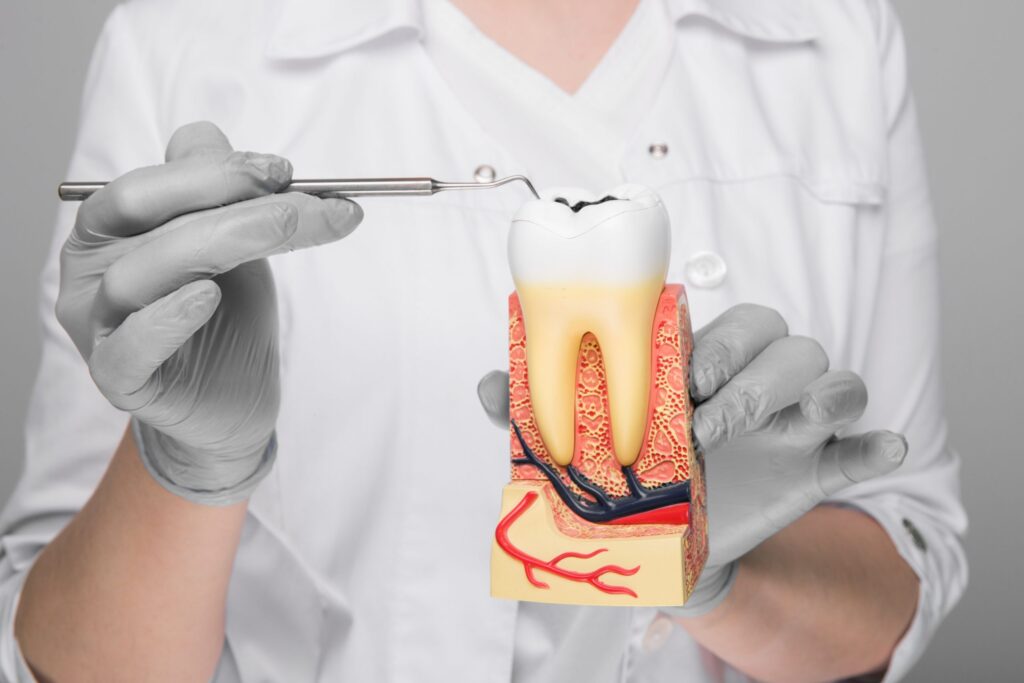
Stages of tooth decay
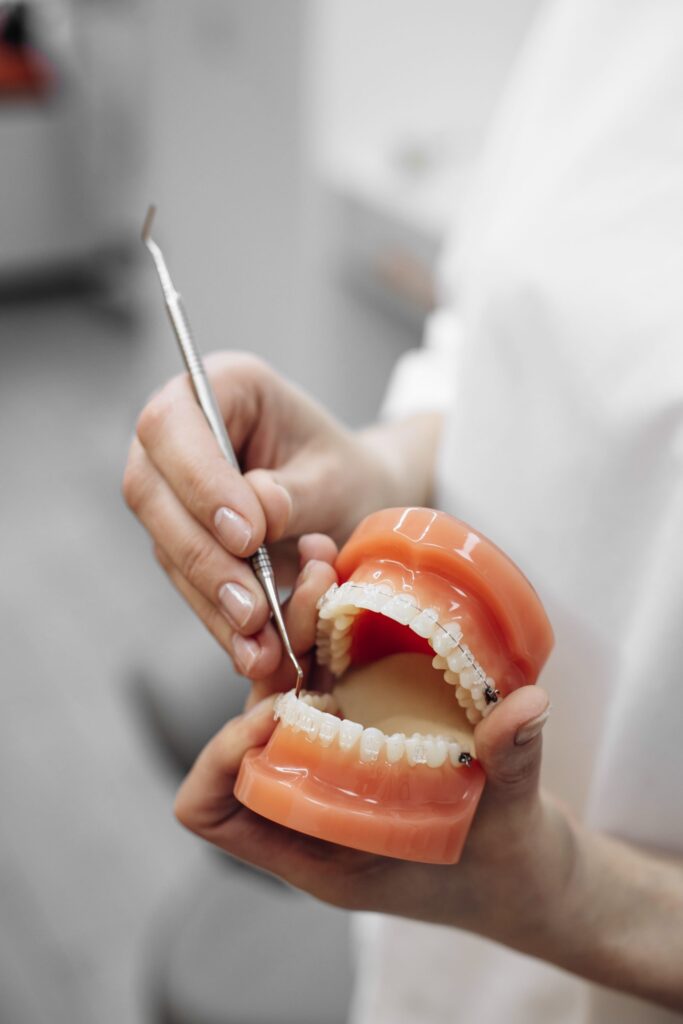
The first stage of dental caries is characterized by the formation of a light yellowish stain on the tooth enamel. You may feel no discomfort at this time, but that does not mean that you should not pay attention to the spots that appear.
At the next stage of decay, the damage spreads from the enamel to dentin, the main tissue of the tooth, which is much softer than the enamel. At this stage, tooth decay can very quickly reach a deep stage, so it is better not to postpone the treatment of caries. By this time, you may notice dark spots, shallow cavities, and experience a nagging pain in the affected tooth. As a result, the pain may occur when eating sweet or sour foods, or when a person is exposed to hot or cold foods.
Deep cavities cause severe pain when eating hot and cold foods, as well as when exposed to sweet, salty and sour foods. If the pain goes away after 10-15 minutes, it means that the decay has not yet developed into pulpitis, and the diseased tooth has a chance to be saved. Another indicator that tooth decay has reached its final stage can be bad breath caused by the active spread of pathogenic bacteria.
Stages of root canal treatment
- Organization of access to the root canal
of the tooth - Removal of the pulp from the root canal.
- Filling the root canal with a material that
helps to seal it (filling).

Price
Price
Our Doctors
Meet our doctors. We look forward to seeing you at our dental clinic


Licenses and Certificates
RCT stands for Root Canal Treatment, a dental procedure that treats infection at the center of a tooth (the root canal system). It’s designed to eliminate bacteria from the infected pulp to prevent reinfection and save the natural tooth.
A root canal is needed when the tooth’s pulp becomes infected or inflamed due to deep decay, repeated dental procedures on the tooth, faulty crowns, or a crack or chip in the tooth. Symptoms might include pain, prolonged sensitivity to heat or cold, tenderness to touch and chewing, discoloration of the tooth, and swelling.
During RCT, the dentist or endodontist (a dentist specializing in root canals) removes the infected or inflamed pulp, carefully cleans and shapes the inside of the canal, a channel inside the root, then fills and seals the space. Afterward, you will return to your dentist, who will place a crown or other restoration on the tooth to protect and restore it to full function.
Root canal procedures have the reputation of being painful. However, most people report that the procedure itself is no more painful than having a filling placed. The discomfort experienced in the period leading up to seeking dental care is truly painful, not the root canal treatment itself.
The canals are typically filled with a material called gutta-percha, a rubber-like material that compresses and fills the canal space, preventing bacteria from re-entering. The tooth may then be capped with a crown to protect it.
RCT is critically important for maintaining oral health as it stops the infection from spreading to other teeth, which can impact overall health and well-being. Removing the infection also preserves the affected tooth, important for chewing and normal mouth function.
Ignoring the need for RCT can lead to severe infection, an abscess, or even spread to the blood vessels and other areas of the body. The tooth may eventually need to be removed.
With proper care, most teeth that have had root canal treatment can last a lifetime. Keeping up with oral hygiene and regular checkups is essential.
For more information or to schedule an appointment for root canal treatment, please review our privacy policy and contact our clinic where your rights are always respected, and your health is our top priority.



